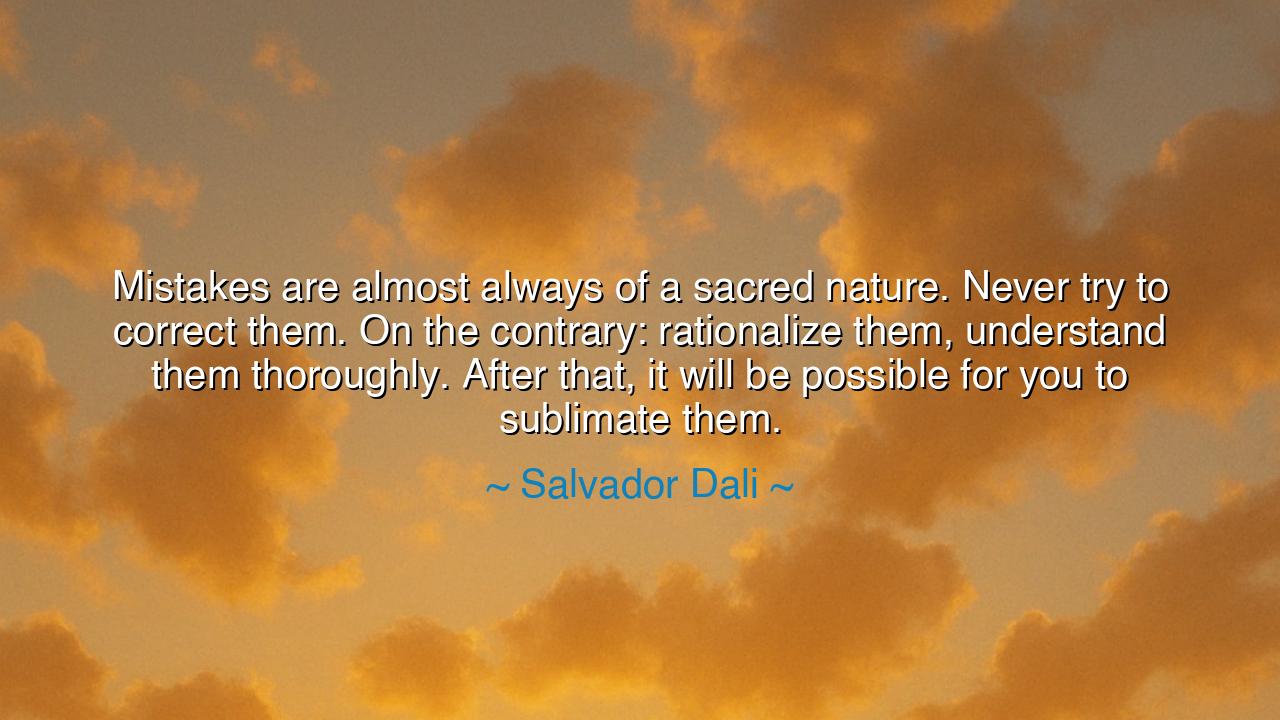
Mistakes are almost always of a sacred nature. Never try to
Mistakes are almost always of a sacred nature. Never try to correct them. On the contrary: rationalize them, understand them thoroughly. After that, it will be possible for you to sublimate them.






Salvador Dalí, that dreamer of impossible landscapes and painter of the subconscious, once proclaimed: “Mistakes are almost always of a sacred nature. Never try to correct them. On the contrary: rationalize them, understand them thoroughly. After that, it will be possible for you to sublimate them.” In this declaration lies the voice of one who saw beyond convention, who perceived in error not shame but revelation. For what men call mistakes are not accidents to be erased, but seeds of discovery, doors through which hidden truths may enter. Dalí knew that imperfection is often the womb of creation, and that to embrace it is to draw nearer to the divine.
The origin of these words rests in Dalí’s surrealist vision. He lived not by the laws of rigid order, but by the flowing movements of the unconscious, the unexpected, the irrational. To him, a spilled brushstroke, a warped form, a crack in the surface was not failure but sacred opportunity. It was in such accidents that the mind was freed from control and allowed to wander into new worlds. The artist, said Dalí, must not rush to erase, but to listen — for the mistake whispers of paths not yet imagined.
History bears witness to this same truth. Think of Christopher Columbus, who sailed westward seeking a passage to Asia but stumbled instead upon a new world. His mistake altered the course of history. Or recall Alexander Fleming, who left his Petri dishes unattended and returned to find mold had destroyed his colonies of bacteria — what could have been dismissed as error became the birth of penicillin, the salvation of millions. Here, too, we see Dalí’s wisdom: the sacred mistake, when understood rather than erased, can be sublimated into triumph.
Consider also the life of Beethoven, who struggled with the mistake of deafness, a flaw that seemed to strike at the very heart of his art. He might have sought only to correct or to despair, but instead he embraced it, listening not with his ears but with the depths of his soul. Out of this seeming ruin came symphonies of unearthly beauty, music that transcended hearing itself. His error was not corrected — it was sublimated, transformed into art immortal.
The lesson is clear: do not fear your errors, nor rush to bury them beneath pretense. They are sacred messengers, revealing weakness, yes, but also pointing toward strength. To deny them is to deny the teacher within them. To cover them is to lose their gift. But to look upon them honestly, to rationalize them, to trace their roots and their meaning, is to gather wisdom. From there, one may rise higher, using the very stone of failure as the foundation of greatness.
What then shall we practice? When you stumble, do not hide it. Write it down. Reflect upon it. Ask what it reveals about yourself, about your path, about the world. Speak of it, not with shame but with curiosity. In time, you will see that the mistake was a signpost, directing you to a road unseen. In your work, in your relationships, in your life, do not destroy the cracks — let them show, let them breathe, let them guide you.
Therefore, O children of imperfection, hear the teaching of Dalí: your mistakes are not your enemies, but your oracles. Treat them as sacred, for within them lies the possibility of transcendence. Do not seek the sterile perfection that dies in silence; seek instead the living path where every fall becomes a step, every flaw a revelation, every failure a doorway to sublimity. For it is not by being flawless that man becomes divine, but by transforming his flaws into light.






AAdministratorAdministrator
Welcome, honored guests. Please leave a comment, we will respond soon